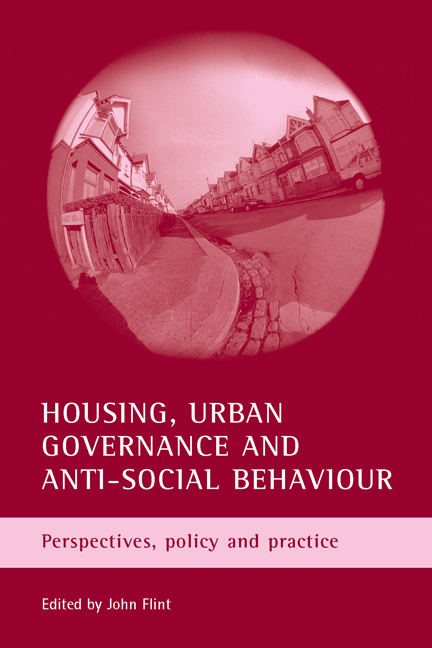Book contents
- Frontmatter
- Contents
- List of tables, figures and photographs
- Acknowledgements
- Notes on contributors
- Introduction
- Part 1 The definition and construction of anti-social behaviour in the UK
- Part 2 Legal techniques and measures utilised by social landlords to address anti-social behaviour
- Part 3 The emerging mechanisms of addressing anti-social behaviour in housing governance
- Part 4 Studies of housing and anti-social behaviour from an international perspective
- Index
seven - The changing legal framework: from landlords to agents of social control
Published online by Cambridge University Press: 15 January 2022
- Frontmatter
- Contents
- List of tables, figures and photographs
- Acknowledgements
- Notes on contributors
- Introduction
- Part 1 The definition and construction of anti-social behaviour in the UK
- Part 2 Legal techniques and measures utilised by social landlords to address anti-social behaviour
- Part 3 The emerging mechanisms of addressing anti-social behaviour in housing governance
- Part 4 Studies of housing and anti-social behaviour from an international perspective
- Index
Summary
Introduction
In this chapter I examine how the legal framework in which social landlords operate in England and Wales has changed since 19961. This period has seen an enormous amount of legal change, offering social landlords one legal tool after another. It seems that social landlords are expected to implement a series of new measures with little time being available to assess the impact of previously introduced measures.
As the chapters in this volume by Helen Carr and Dave Cowan (Chapter Three) and John Flint (Chapter One) illustrate, those providing social housing have historically always had some interest in the control of the behaviour of their tenants (Clapham, 1997; Burney, 1999). This has shown itself both in the control of access to social housing and the control of conduct, exemplified through the old housing visitors, who would come and inspect how tenants kept their home (Damer, 2000). Notwithstanding this history, however, Haworth and Manzi (1999) have noted how the control of tenants’ conduct has emerged more forcefully in recent years and is strongly influenced by the specific policy discourse of ‘residualisation’, ‘social exclusion’ and ‘underclass’ theories (see Pauline Card, Chapter Two, this volume, for a further discussion). In this context the ever-increasing legal tools can be seen as part of the technologies of government, seeking to shape the conduct of social tenants.
Rather than provide a chronological account of the changes, I have sought to identify various thematic changes that emerge from the legislation. The first part of this chapter considers two specific legislative changes: the introductory tenancy and the statutory injunction. The second part of the chapter considers how changes to legal powers have broadened the scope and focus of housing interventions. I also consider what evidence there is about how these changes have been implemented by social landlords and assess the nature of these tools in order to question whether they are more symbolic than real.
It is helpful to identify at the outset the different legislative changes that will be discussed in the remainder of the chapter. These changes should be understood in the context that the vast majority of local authority and housing association tenants are either secure or assured tenants, who can only be evicted from their homes if the landlord can prove that one of the grounds for possession has been met and (generally) that it is reasonable for possession to be granted.
- Type
- Chapter
- Information
- Housing, Urban Governance and Anti-Social BehaviourPerspectives, Policy and Practice, pp. 137 - 154Publisher: Bristol University PressPrint publication year: 2006
- 1
- Cited by



